Myanmar migrants face being exploited under Thai deportation system
2023.02.06
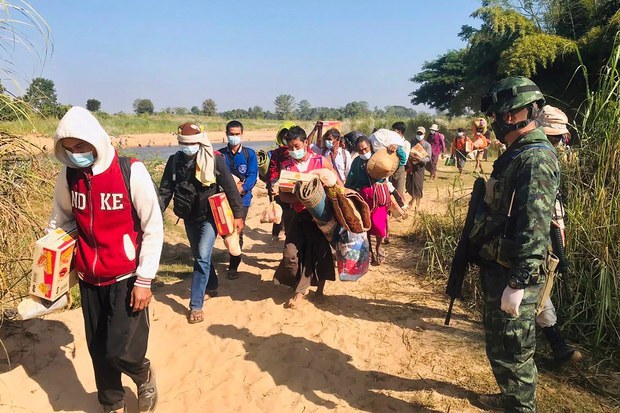 Thai soldiers stand guard in Mae Sot as Myanmar refugees arrive after fleeing clashes between the military and ethnic Karen rebels, Dec. 22, 2021.
Thai soldiers stand guard in Mae Sot as Myanmar refugees arrive after fleeing clashes between the military and ethnic Karen rebels, Dec. 22, 2021.
Burmese political activists Cherry and Min Thura were walking to a cafe in the Thai border city of Mae Sot when they were stopped by police.
What happened next was the beginning of a nightmare that has haunted thousands of migrants fleeing Myanmar since the February 2021 coup that toppled Aung San Suu Kyi’s democratically elected government.
With no official documentation, they were arrested, setting in motion a chain of events and spiraling fines, which some advocates said are bribes, to stay in Thailand.
“We just apologized and asked them to release us. But they didn’t accept that, they just wanted to send us to Myanmar or pay (the money),” former political prisoner Cherry, 27, told Radio Free Asia.
For three days, she and her boyfriend, Min Thura, 26, frantically contacted their families and friends from prison cells in Mae Sot to pay the 10,000 baht (about U.S. $300) “fee” to gain their release. Both said those are not their real names because of their status in Thailand.
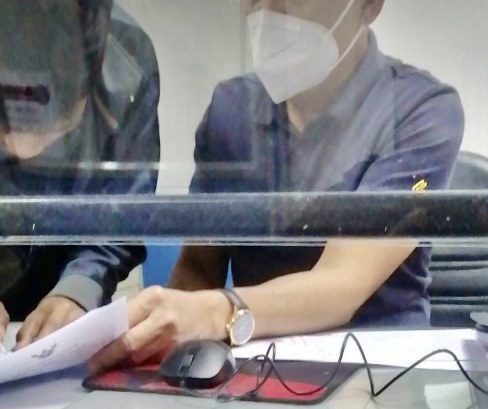
Their story is not unique. Naing Aung Aung, the head of the Mae Sot migrant advocacy group Arakan Workers’ Organization, pointed out that up to 75% of cases will end in deportation and the threat of imprisonment and torture.
“For migrant workers, the police department is like hell. They can’t ask for help from them because most of the police are just asking for money,” he said.
Patrick Phongsathorn, a senior advocacy specialist at Fortify Rights, an NGO specializing in Myanmar, went even further. “In all of the cases where refugees have been arrested and that we have spoken to, they have been asked for bribes – it’s very common,” he said.
Thailand to investigate
Fortify Rights reported on Thursday that the National Human Rights Commission of Thailand will investigate the Thai government’s treatment of Myanmar refugees after the group shared evidence of potential violations. They included “forced returns, arbitrary arrests, detention and extortion by Thai authorities.”
Thai police did not immediately respond to a request from RFA for comment on the extortion allegation.
In an Associated Press report on April 20, 2022, Thai Foreign Affairs spokesman Tanee Sangrat said the government “categorically denied” the existence of any extortion or bribery.
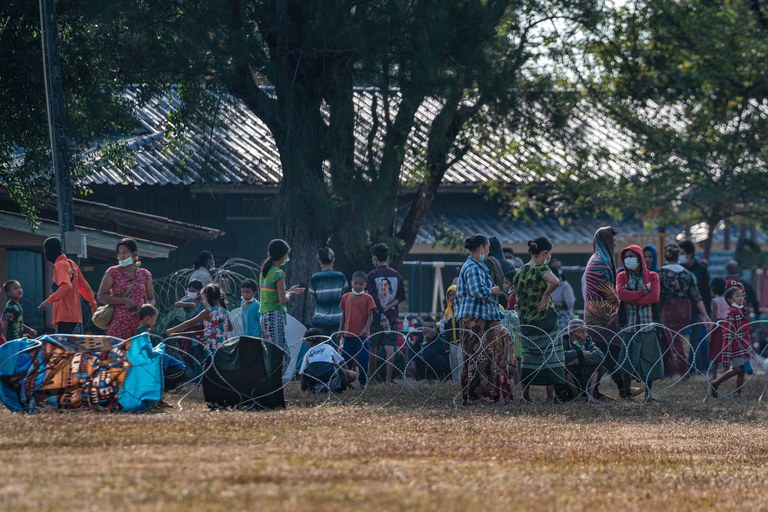
Still, the cost of staying in the country comes at a heavy price and a permanent state of “legal limbo.” At the crux of the problem are “police cards” or unofficial documents allowing Burmese migrant workers to avoid arrest or deportation.
They are purchased monthly through middlemen or brokers and can now cost 300 to 350 baht ($9 to $11), according to the Arakan Workers’ Organization. Yet buying a “police card” is not a guarantee of not being randomly arrested on the streets or deported, Cherry and Min Thura said.
“I thought they wouldn’t arrest us if we (had a) police card. But in reality, it cannot protect us from arrest. There are no human rights for a human being, for a Burmese, and for an illegal resident. We are refugees,” said Min Thura, which is not his real name because of his status in Thailand. It has not ratified the United Nations Refugee Convention and does not officially recognize refugees.
Numbers climbing
Since the military seized power in Myanmar, advocacy group the Foundation for Education and Development has reported that arrests of Burmese migrants have at least doubled while deportations also are on the rise. The Thai NGO recorded 1,400 migrants and 181 arrests in 2022.
Yet the group’s spokesman Min Oo said those figures only scratch the surface. “There are a lot of unknown cases that are beyond us, [those] that we can’t reach,” he said.
“A recent report from the U.N. Office for the Coordination of Humanitarian Affairs estimated that between 2,000 and 5,000 people a month returned to Myanmar in 2022. Most of them were deported. For those forced into exile, the risks loom large over their lives. “
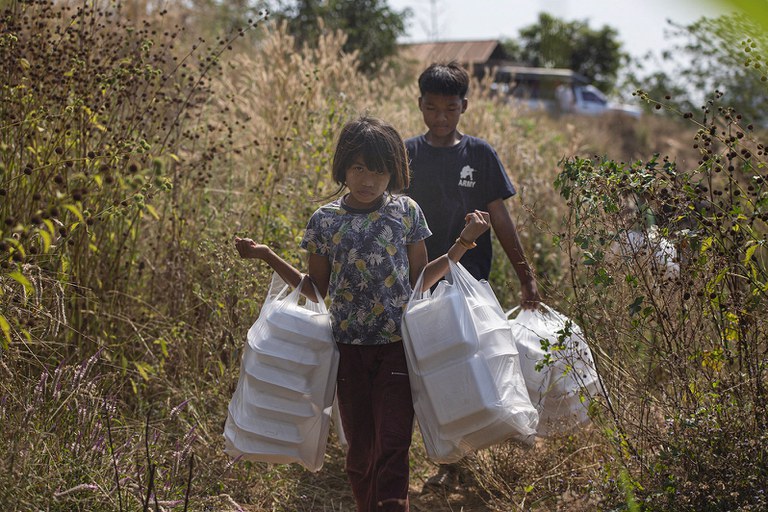
Aung Kyaw, chairman of the Migrant Workers Rights Network, told RFA that the number of people crossing into Thailand increased from 100 per day in 2020 to 2,000 per day in 2022. Thai authorities reported that 60,000 migrants were arrested last year, including up to 45,000 who left Myanmar.
Before fleeing to Thailand, Cherry spent seven months in prison for her role in the protest movement that swept across the war-torn country. Min Thura also lives in fear after being stopped five times by the Thai police. On each occasion, he paid a few thousand baht to avoid arrest and deportation.
“We are in a life-threatening situation there (in Myanmar). That is why I paid [the police] the money,” he said.
As for the Burmese authorities, they tend to target those involved with the Civil Disobedience Movement, in which government workers have walked off the job in protest of the military coup, or other resistance groups.
High-profile detainees in Thailand reportedly have paid as much as 50,000 baht ($1,520) to stop being deported. Those who have been taken back to the border face a much riskier option by paying Burmese guards at the checkpoints 500,000 kyat ($240) to be released.
Increasingly unable to help
The Arakan Workers’ Organization said humanitarian groups have become increasingly sidelined from the deportation process. Previously, they met monthly with immigration officials and provided humanitarian aid and welfare checks. But for the last two years, the Thai government reportedly has been cooperating with the Myanmar junta in coordinating deportations.
“When NGOs can’t get involved anymore, the only people who suffer are the migrant workers,” said Naing Aung Aung of AWO. “Even [before the coup], there were so many people whose families did not know they had been arrested. But we were able to share information. Now, we can’t do that anymore.”
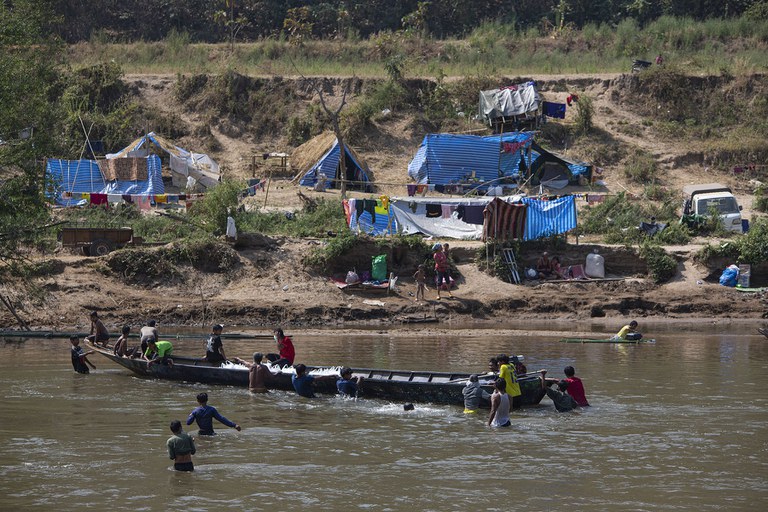
The Thailand Immigration Bureau did not immediately respond to RFA’s request for comment.
For Cherry and Min Thura, such help would have been a welcome relief in contacting their parents as they languished in prison. They said Thai police charged them 300 baht ($9) for each phone call.
“As you know, I don’t have a family here,” Min Thura said. “We all arrive alone and no one can help in this kind of situation.”
Radio Free Asia, a news service affiliated with BenarNews, produced this report.







